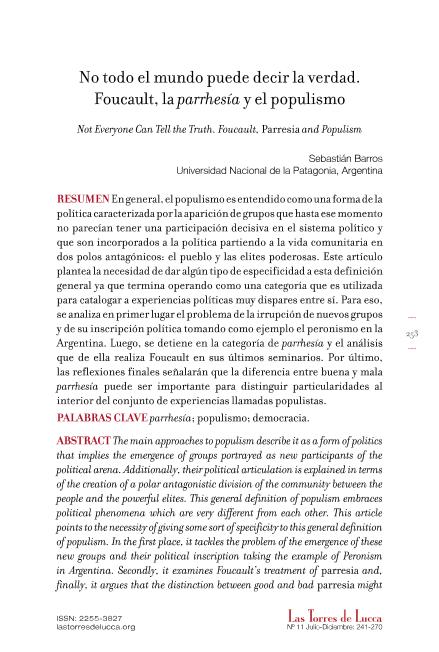Mostrar el registro sencillo del ítem
dc.contributor.author
Barros, Manuel Sebastian

dc.date.available
2018-05-23T20:16:56Z
dc.date.issued
2017-12
dc.identifier.citation
Barros, Manuel Sebastian; No todo el mundo puede decir la verdad. Foucault, la parrhesía y el populismo; Universidad Complutense de Madrid; Las Torres de Lucca; 6; 11; 12-2017; 251-282
dc.identifier.issn
2255-3827
dc.identifier.uri
http://hdl.handle.net/11336/46025
dc.description.abstract
En general, el populismo es entendido como una forma de la política caracterizada por la aparición de grupos que hasta ese momento no parecían tener una participación decisiva en el sistema político y que son incorporados a la política partiendo a la vida comunitaria en dos polos antagónicos: el pueblo y las elites poderosas. Este artículo plantea la necesidad de dar algún tipo de especificidad a esta definición general ya que termina operando como una categoría que es utilizada para catalogar a experiencias políticas muy dispares entre sí. Para eso, se analiza en primer lugar el problema de la irrupción de nuevos grupos y de su inscripción política tomando como ejemplo el peronismo en la Argentina. Luego, se detiene en la categoría de parrhesía y el análisis que de ella realiza Foucault en sus últimos seminarios. Por último, las reflexiones finales señalarán que la diferencia entre buena y mala parrhesía puede ser importante para distinguir particularidades al interior del conjunto de experiencias llamadas populistas.
dc.description.abstract
The main approaches to populism describe it as a form of politics that implies the emergence of groups portrayed as new participants of the political arena. Additionally, their political articulation is explained in terms of the creation of a polar antagonistic division of the community between the people and the powerful elites. This general definition of populism embraces political phenomena which are very different from each other. This article points to the necessity of giving some sort of specificity to this general definition of populism. In the first place, it tackles the problem of the emergence of these new groups and their political inscription taking the example of Peronism in Argentina. Secondly, it examines Foucault’s treatment of parresia and, finally, it argues that the distinction between good and bad parresia might be important in order to make distinctions within the field of the so called populist political articulations.
dc.format
application/pdf
dc.language.iso
spa
dc.publisher
Universidad Complutense de Madrid

dc.rights
info:eu-repo/semantics/openAccess
dc.rights.uri
https://creativecommons.org/licenses/by-nc-sa/2.5/ar/
dc.subject
Populismo
dc.subject
Foucault
dc.subject
Parresia
dc.subject
Popular
dc.title
No todo el mundo puede decir la verdad. Foucault, la parrhesía y el populismo
dc.title
Not everyone can tell the truth. Foucault, parresia and populism
dc.type
info:eu-repo/semantics/article
dc.type
info:ar-repo/semantics/artículo
dc.type
info:eu-repo/semantics/publishedVersion
dc.date.updated
2018-05-23T13:34:12Z
dc.journal.volume
6
dc.journal.number
11
dc.journal.pagination
251-282
dc.journal.pais
España

dc.journal.ciudad
Madrid
dc.description.fil
Fil: Barros, Manuel Sebastian. Universidad Nacional de la Patagonia ; Argentina. Consejo Nacional de Investigaciones Científicas y Técnicas; Argentina
dc.journal.title
Las Torres de Lucca
dc.relation.alternativeid
info:eu-repo/semantics/altIdentifier/url/http://www.lastorresdelucca.org/index.php/ojs/article/view/157
Archivos asociados
